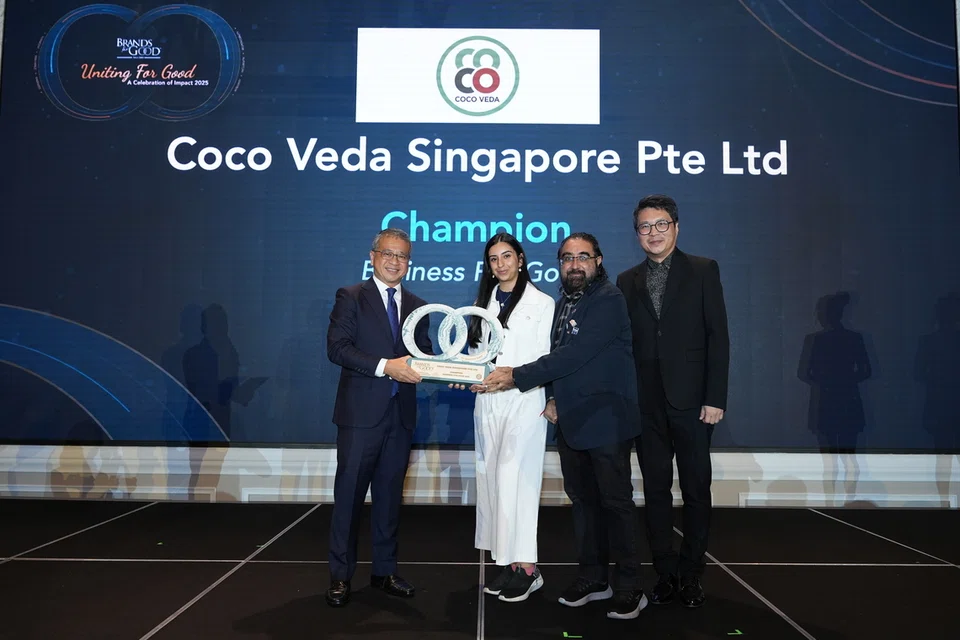Coco Veda is a Singaporean social enterprise that creates wellness-focused lifestyle products, with coconut as its base and sustainability at its core.
The brand’s integrated impact model – combining women’s empowerment, farmer livelihood, consumer lifestyle benefits, and sustainable environmental business practices – earned its founders, Ms Simarna Singh and Mr Raj Singh, the Business for Good Award at this year’s Brands for Good Awards Gala, held at the Orchard Hotel Singapore on July 23.
This award honours organisations that have reimagined their business models to achieve commercial success while creating significant societal and environmental impact.
Minister for Law and Second Minister for Home Affairs Edwin Tong was the guest of honour, presenting awards to a total of 45 businesses and individuals. “These corporates show us that values drive value, and that doing good is good business,” Mr Tong shared on LinkedIn after the event.
The father-daughter team started Coco Veda in 2016 to create something meaningful. “I have always loved sustainability, and entrepreneurship excites me because you get to build something on your own,” Ms Simarna said.
They settled on the coconut industry due to the fruit’s intrinsic health benefits, as well as the opportunity to make a difference in the farmers’ livelihood.
The Philippines, one of the world’s largest exporters of coconut products, served as the ideal base for the brand. The local industry is managed by the Philippine Coconut Authority, a government ministry that oversees about a thousand coconut cooperatives.
“We chose the Philippines because of the structure and the ease of working with these cooperatives, rather than owning a farm,” Ms Simarna said.
Because of this, Coco Veda purchases raw coconut oil and coconut sap sugar at double the value of a coconut fruit from three trusted cooperatives. “We don’t just buy coconuts from the farmers because that doesn’t make us any different from anyone else,” Mr Raj explained.
The raw coconut oil is then filtered at their small manufacturing facility in Manila, where their six women employees are based. Coco Veda employs only women, in alignment with the United Nation’s Sustainable Development Goal #10, which aims to reduce gender inequality.
The employees have limited formal education but are trained and certified with Coco Veda’s support, as their facilities are routinely audited by the Philippines’ Food and Drug Administration.
The brand’s products are crafted by hand. “Making these products in a manual setting with the formulation requires great precision,” said Mr Raj, adding that, “even if you go wrong by 0.1 per cent, it can have an impact on the output.”
These formulations have been thoughtfully developed with consultants from the Philippines, Sri Lanka, and India to tackle a variety of lifestyle concerns, such as stiff necks, muscle and joint aches, hairfall, dandruff, headaches, and sinus issues.
Coco Veda combines the words “coconut” and “Ayurveda”, reflecting the brand’s inspiration from traditional Indian plant-based remedies. Its signature product, the food-grade virgin coconut oil, forms the base of all its formulations.
An example is the Coco Sniff, a wellness oil designed to relieve nasal and sinus congestion. The ingredients include eucalyptus, ginger, peppermint and clove. “We use cloves in our own household as mouth fresheners, so it’s also about using ingredients known for their ancient Indian medicinal benefits,” Ms Simarna said.
Coco Veda products are also alcohol-free, and they do not contain water, making them highly concentrated and longer-lasting, when used as directed and are priced from S$10 to S$38.
The brand also partners with corporations through pop-ups, offering handmade, sustainable gift sets as an alternative to mass-produced merchandise and is now available in Singapore Airlines’ KrisShop, though meeting large retail key performance indicators as a small business remains a challenge.
As a result, the brand focuses on preventive health and sustainability as its key selling points. “For us in Singapore, because we are an ageing population, I think it’s significantly important and more people should pay attention to preventive health,” Mr Raj said.


